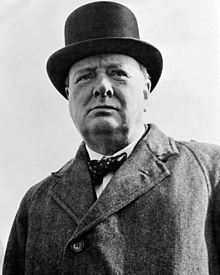https://www.theguardian.com/education/2014/oct/30/learning-another-language-ten-tips
- Set your goals. Tangible and specific goals to make it easier and feel motivated.
- Motivation. Reminding yourself the reason you want to learn a language.
- Learn vocabulary in context. That is the best way to retain new words.
- Revise your own native language. You won't make progress on a new language until you understand your own.
- Ignore the myths. It does not matter how old are you. It's never too late to start learning a new language.
- Travel to a country where the language you want to study is spoken. You will be forced to communicate in that language.
Winston Churchill, The battle of France.
Regarding the exercise of modal verbs, here we have a part of the speech that Churchill gave during the battle of France.
Regarding the exercise of modal verbs, here we have a part of the speech that Churchill gave during the battle of France.
"I have, myself, full
confidence that if all do their duty, if nothing is neglected, and if the best
arrangements are made, as they are being made, we shall prove ourselves once
again able to defend our Island home, to ride out the storm of war, and to outlive
the menace of tyranny, if necessary for years, if necessary alone. At any rate,
that is what we are going to try to do. That is the resolve of His Majesty’s
Government-every man of them. That is the will of Parliament and the nation.
The British Empire and the French Republic, linked together in their cause and
in their need, will defend to the death their native soil, aiding each other
like good comrades to the utmost of their strength. Even though large tracts of
Europe and many old and famous States have fallen or may fall into the grip of
the Gestapo and all the odious apparatus of Nazi rule, we shall not flag or
fail. We shall go on to the end, we shall fight in France, we shall fight on
the seas and oceans, we shall fight with growing confidence and growing
strength in the air, we shall defend our Island, whatever the cost may be, we
shall fight on the beaches, we shall fight on the landing grounds, we shall
fight in the fields and in the streets, we shall fight in the hills; we shall
never surrender, and even if, which I do not for a moment believe, this Island
or a large part of it were subjugated and starving, then our Empire beyond the
seas, armed and guarded by the British Fleet, would carry on the struggle,
until, in God’s good time, the New World, with all its power and might, steps
forth to the rescue and the liberation of the old."
The modal verbs that appear are the following:
may: used to say that something is possible. "may fall into the grip of the Gestapo"
might: in this case 'might' does not function as a modal verb. It means great power or strength.
shall: in this case is used to express an obligation, command or instruction.
would: would is used in the text to express future.
will: this word appears two times, in this example: "that is the will of the parliament", will does not function as a modal verb but as a noun. And in the other example it functions as a modal verb, it expresses future tense.
Moving to the things that I have been doing for the last four weeks to improve my English, I am doing a couple of activities that are helping me a lot. I have bought three poetry books and I read them when I am on the train on my way home and I have been watching a TV show, with English subtitles, named 'Teen Wolf'
Sara BahadiThe modal verbs that appear are the following:
may: used to say that something is possible. "may fall into the grip of the Gestapo"
might: in this case 'might' does not function as a modal verb. It means great power or strength.
shall: in this case is used to express an obligation, command or instruction.
would: would is used in the text to express future.
will: this word appears two times, in this example: "that is the will of the parliament", will does not function as a modal verb but as a noun. And in the other example it functions as a modal verb, it expresses future tense.
Moving to the things that I have been doing for the last four weeks to improve my English, I am doing a couple of activities that are helping me a lot. I have bought three poetry books and I read them when I am on the train on my way home and I have been watching a TV show, with English subtitles, named 'Teen Wolf'

No hay comentarios:
Publicar un comentario